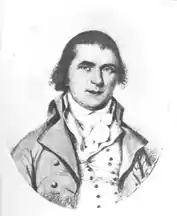Andrew Moore | |
|---|---|
 | |
| United States Senator from Virginia | |
| In office December 4, 1804 – March 4, 1809 | |
| Preceded by | William Branch Giles |
| Succeeded by | Richard Brent |
| In office August 11, 1804 – December 4, 1804 | |
| Appointed by | John Page |
| Preceded by | Wilson Cary Nicholas |
| Succeeded by | William Branch Giles |
| Member of the U.S. House of Representatives from Virginia's 5th district | |
| In office March 5, 1804 – August 11, 1804 | |
| Preceded by | Thomas Lewis, Jr. |
| Succeeded by | Alexander Wilson |
| Member of the U.S. House of Representatives from Virginia's 2nd district | |
| In office March 4, 1793 – March 4, 1797 | |
| Preceded by | John Brown |
| Succeeded by | David Holmes |
| Member of the U.S. House of Representatives from Virginia's 3rd district | |
| In office March 4, 1789 – March 3, 1793 | |
| Preceded by | Position established |
| Succeeded by | Joseph Neville |
| Personal details | |
| Born | 1752 near Fairfield, Virginia Colony, British America |
| Died | April 14, 1821 (aged 68–69) Lexington, Virginia, U.S. |
| Political party | Democratic-Republican |
| Military service | |
| Branch/service | Continental Army Virginia Militia |
| Rank | Major General |
| Battles/wars | American Revolutionary War Battle of Saratoga |
Andrew Moore (1752 – April 14, 1821) was an American lawyer and politician from Lexington, Virginia. Moore studied law under George Wythe and was admitted to the bar in 1774.[1] He rose to the rank of captain in the Continental Army during the American Revolutionary War, seeing action at Saratoga. After the war he was eventually commissioned a major general in the Virginia militia in 1803. He was a delegate to the Virginia convention that ratified the United States Constitution in 1788. He was a member of the Virginia legislature from 1791 to 1789 and from 1799 to 1800.[1] He represented Virginia in both the U.S. House (1789–1797, 1804) and the U.S. Senate (1804–1809).
Electoral history
- 1789; Moore was elected to the U.S. House of Representatives with 84.16% of the vote, defeating Independent George Hancock.
- 1790; Moore was re-elected unopposed.
- 1793; Moore was re-elected unopposed.
- 1795; Moore was re-elected unopposed.
In 1803, Moore initially lost a very close race to Thomas Lewis and Lewis was seated. But Moore contested the result and in 1804, after Congress determined that several votes were cast - for both candidates - by someone who was unqualified, Moore was declared the winner.[2]
References
- 1 2 Tyler, Lyon Gardiner (1915). ENCYCLOPEDIA OF VIRGINIA BIOGRAPHY, Volume II. pp. 88–89.
- ↑ "Virginia 1803 U.S. House of Representatives, District 5". Retrieved November 22, 2022.
External links

